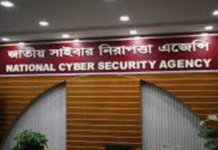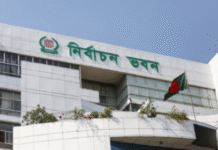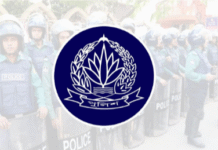Bangladesh on Sunday said it would launch legal and diplomatic efforts to repatriate an alleged 1971 war crimes accused from the UK, who is now one of Britain’s most prominent Muslim leaders.
The reaction came a day after Choudhury Muenuddin in an interview with the Al Jazeera declined to appear before the Bangladeshi war crimes tribunal saying “the tribunal in Bangladesh is a joke, its a sham trial.”
“Choudhury Mueenuddin himself is an accused who is wanted particularly for the systematic killings of top intellectuals just ahead of the December 16, 1971 victory against Pakistan. Don’t you think it is natural on his part to make such claims about the trial,” attorney general Mahbubey Alam told PTI.
Alam said, Mueenuddin, a former journalist, and his fellow war crimes accused Mohammad Ashrafuzzaman Khan alias Nayeb Ali would be tried in absentia if they could not be brought back.
“We know one of them (Mueenuddin) is living in Britain and the other is in the United States. We will do all we can to return them home to be exposed to justice,” a foreign ministry spokesman told the agency.
Mueenuddin also denied involvement in “any criminal activities of any nature” in the 1971 liberation war or since, saying, “In fact, I was not even a supporter of military action and I resigned my political posts after the military crackdown.”
Mueenuddin and Khan were two leaders of the infamous Al-Badr militia manned mostly by students of the radical Jamaat-e-Islami party which was opposed to Bangladesh’s independence from Pakistan and they fled the country when Pakistani troops surrendered after their defeat in the war.
The prosecution lawyers said they had gathered specific evidence that Mueenuddin played a crucial role in the massacre of intellectuals opposed to the Islamists on December 14, 1971 just before the war ended while archival media documents revealed that he had acted like a secret killer.
The International Crimes Tribunal (ICT-2) on June 24 indicted Mueenuddin and Khan on 11 counts of ‘crimes against humanity’ committed during the war.
According to the prosecution evidence, Mueenuddin was the Al-Badr operation in-charge while Ashrafuzzaman Khan was the chief executor of the Gestapo-like elite militia force which is accused of killing top intellectuals, doctors, scholars and journalists during the war.
The tribunals have already handed down death penalty to four top Jamaat leaders and life imprisonment to two others triggering violence across the country that claimed over 150 lives since the first sentence was awarded in January this year.
Source: UNBConnect











FUTILITY OF VINDICTIVE HASINA’S POLITICALLY MOTIVATED KANGAROO COURT TRAVESTY OF SO CALLED WAR CRIMINALS IN THE NAME OF JUSTICE IS EVEN QUESTIONED BY INDIAN OLDEST ENGLISH LANGUAGE DAILY, THE STATESMAN
Bangladesh war crimes: Fair trial or persecution?
http://www.thestatesman.net/news/6440-bangladesh 21.07.2013.Bangladesh Prime Minister Sheikh Hasina Wajid must ask herself what exactly will be achieved by the war crimes trials, whose fairness has been questioned by Bangladesh opposition leaders and human rights’ activists. Last week, a court sentenced a Jamaat-i-Islami leader to death two days after a life sentence was given to a former JI head for a slew of crimes that ranged from the torture of intellectuals to what was termed as genocide. At least five people have been killed in the latest wave of violence as Islamist activists protested against the conviction of former JI head Ghulam Azam. As the trials proceed, it has become impossible to avoid the impression that the judicial proceedings have acquired a partisan character. (1)—-
Those on trial also include leaders of the opposition Bangladesh National Party led by Khaleda Zia. The former prime minister has called the trials a “farce” because she believes that the ruling Awami League is using the courts to persecute the opposition.
The AL included the trials in its 2010 campaign, and there is no doubt this must have partly helped it win the polls. But reopening old wounds at a time when the country is already in the grip of severe political violence that has left scores dead doesn’t make political sense. Polarisation between the Islamists and their opponents can quickly degenerate into utter lawlessness as exemplified by the Shahbag protests that are too recent to be forgotten. The 1971 civil war and the brutalities that took place were no doubt traumatic happenings, but the AL government should try to heal the wounds and achieve internal reconciliation instead of exploiting that tragedy through a bizarre mixture of politics and law. A continuation of the trials could push Bangladesh into anarchy.Dawn/ ann (2)—
“The 1971 civil war and the brutalities that took place were no doubt traumatic happenings, but the AL government should try to heal the wounds’
That’s what govt should do. Those who lost their father/ brothers/sisters/relations, those who were severely injured and their sanctity violated, those who lost everything and those who were tortured CAN THEY FORGIVE THE OFFENDERS?
What these criminals are trying is to take benefit of their age, reputation and power in the society to get rid of t heir offenses.
Some depict the events of 1971 as civil war without recognizing that it was an war of independence . /liberation from some devils exploiting us in the name of religion .
Because these people never wanted to be independent. DO THEY STILL WANT TO BE A PART OF PAKISTAN?
If we want rule of law then the war criminals must face the trial. FOR THAT MATTER WHOEVER VIOLATE THE ETHICAL CODES SHOULD BE BROUGHT TO JUSTICE.